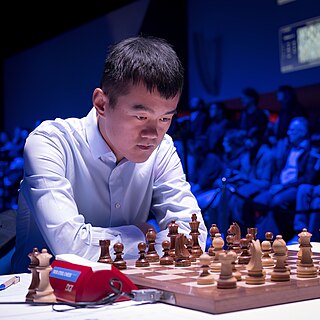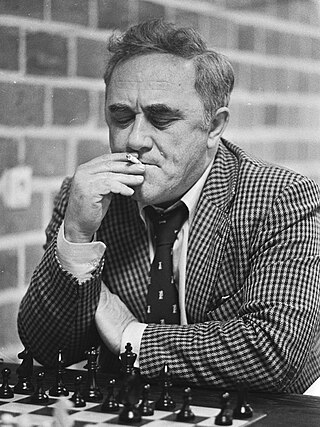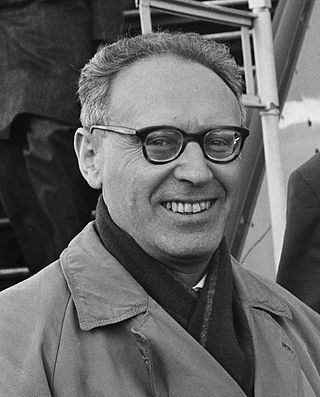
The International Chess Federation or World Chess Federation, commonly referred to by its French acronym FIDE, is an international organization based in Switzerland that connects the various national chess federations and acts as the governing body of international chess competition. FIDE was founded in Paris, France, on July 20, 1924. Its motto is Gens una sumus, Latin for 'We are one Family'. In 1999, FIDE was recognized by the International Olympic Committee (IOC). As of December 21, 2023, there are 201 member federations of FIDE.

The World Chess Championship is played to determine the world champion in chess. The current world champion is Ding Liren, who defeated his opponent Ian Nepomniachtchi in the 2023 World Chess Championship. Magnus Carlsen, the previous world champion, had declined to defend his title.

David Ionovich Bronstein was a Soviet chess player. Awarded the title of International Grandmaster by FIDE in 1950, he narrowly missed becoming World Chess Champion in 1951. Bronstein was one of the world's strongest players from the mid-1940s into the mid-1970s, and was described by his peers as a creative genius and master of tactics. He was also a renowned chess writer; his book Zurich International Chess Tournament 1953 is widely considered one of the greatest chess books ever written.

Efim Petrovich Geller was a Soviet chess player and world-class grandmaster at his peak. He won the Soviet Championship twice and was a Candidate for the World Championship on six occasions. He won four Ukrainian SSR Championship titles and shared first in the 1991 World Seniors' Championship, winning the title outright in 1992. His wife Oksana was a ballet dancer while his son Alexander was also a chess master. Geller was coach to World Champions Boris Spassky and Anatoly Karpov. He was also an author.
The Candidates Tournament is a chess tournament organized by FIDE, chess's international governing body, since 1950, as the final contest to determine the challenger for the World Chess Championship. The winner of the Candidates earns the right to a match for the World Championship against the incumbent world champion.

Lajos Portisch is a Hungarian chess Grandmaster, whose positional style earned him the nickname, the "Hungarian Botvinnik". One of the strongest non-Soviet players from the early 1960s into the late 1980s, he participated in twelve consecutive Interzonals from 1962 through 1993, qualifying for the World Chess Championship Candidates Cycle a total of eight times. Portisch set several all-time records in Chess Olympiads. In Hungarian Chess Championships, he either shared the title or won it outright a total of eight times. He won many strong international tournaments during his career. In 2004, Portisch was awarded the title of 'Nemzet Sportolója', Hungary's highest national sports achievement award.

At the World Chess Championship 1963, Tigran Petrosian narrowly qualified to challenge Mikhail Botvinnik for the World Chess Championship, and then won the match to become the ninth World Chess Champion. The cycle is particularly remembered for the controversy surrounding the Candidates' Tournament at Curaçao in 1962, which resulted in FIDE changing the format of the Candidates Tournament to a series of knockout matches.
The Interregnum of World Chess Champions lasted from the death of incumbent World Chess Champion Alexander Alekhine on 24 March 1946, until Mikhail Botvinnik won a specially organized championship tournament to succeed him on 17 May 1948.

The 1951 World Chess Championship was played between Mikhail Botvinnik and David Bronstein in Moscow from March 15 to May 11, 1951. It was the first match played under the supervision of FIDE; and the first to use a qualifying system of an Interzonal and Candidates Tournament to choose a challenger - a system which stayed in place until 1993.

A World Chess Championship was played between Mikhail Botvinnik and Vasily Smyslov in Moscow from March 5 to April 27, 1957. Botvinnik had been World Champion since 1948, while Smyslov earned the right to challenge by winning the 1956 Candidates tournament. This was the second World Championship match between the pair, after the drawn 1954 match.

A World Chess Championship was played between Tigran Petrosian and Boris Spassky in Moscow from April 9 to June 9, 1966. Petrosian won.
The 1972 Women's World Chess Championship was won by Nona Gaprindashvili, who successfully defended her title against challenger Alla Kushnir. This was the third consecutive title match between the two strongest female players of their time.
The 1975 Women's World Chess Championship was won by Nona Gaprindashvili, who successfully defended her title against challenger Nana Alexandria. This was Gaprindashvili's fourth title defense - and the last successful one.
The 1981 Women's World Chess Championship was won by Maia Chiburdanidze, who successfully defended her title against challenger Nana Alexandria after a closely fought match, which ended in an 8-8 tie.
The 1988 Women's World Chess Championship was won by Maia Chiburdanidze, who successfully defended her title against challenger Nana Ioseliani.
The 1993 Women's World Chess Championship was won by Xie Jun, who successfully defended her title against challenger Nana Ioseliani in the title match.

The 1999 Women's World Chess Championship was won by former champion Xie Jun, who regained her title after defeating Alisa Galliamova. Previous to the match, reigning champion Susan Polgar had been stripped of her title after much controversy.
The Women's World Chess Championship was established by FIDE in 1927. The format and regularity of the event has changed many times.
The 1948 Interzonal tournament was a major qualification event for the 1951 World Chess Championship, held in Saltsjöbaden, Sweden from 16 July to 14 August in 1948. It was the first Interzonal tournament organised by FIDE, which was at the time emerging as the game's international governing body. The 20 player round robin tournament was won by David Bronstein, who along with seven other players advanced to the 1950 Candidates Tournament.








